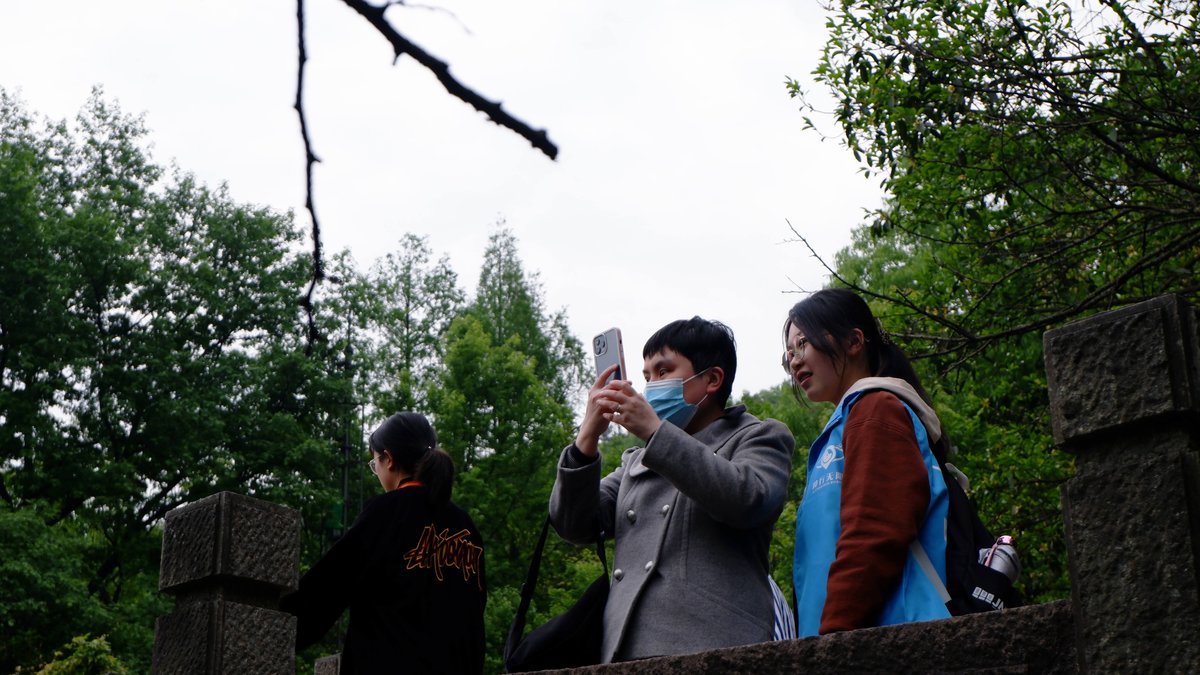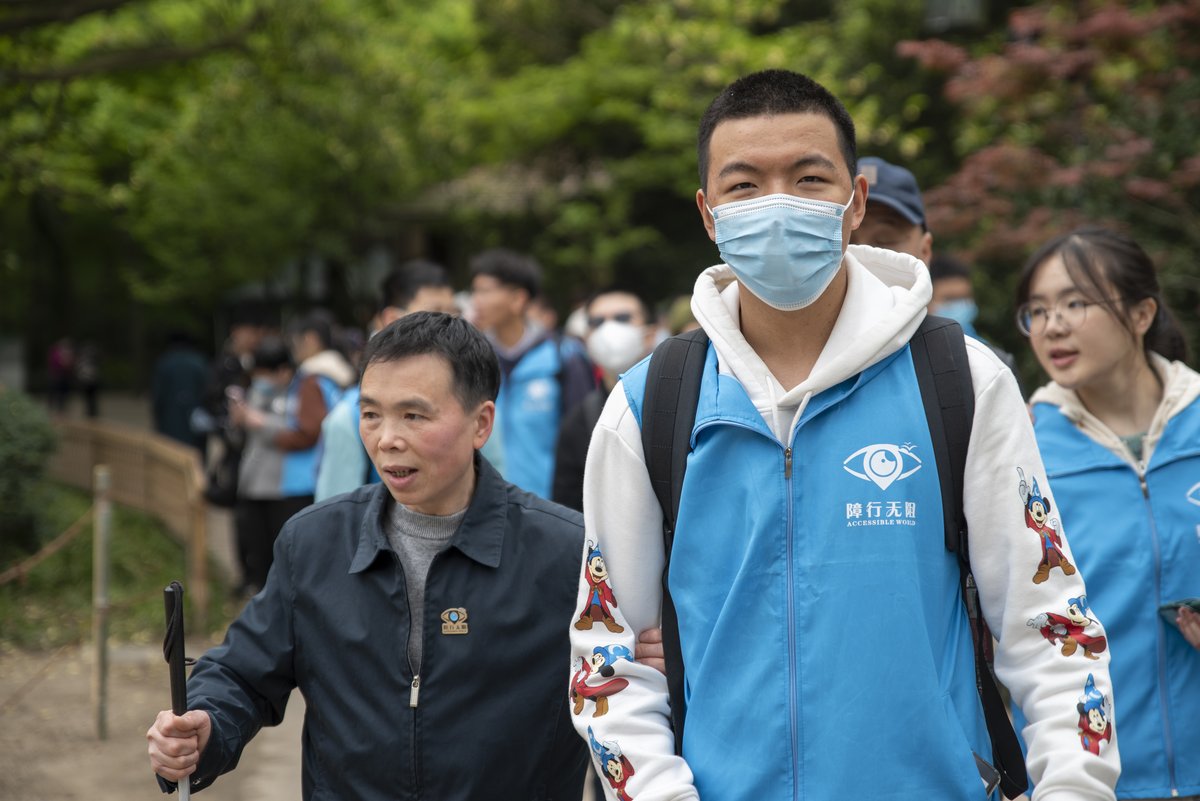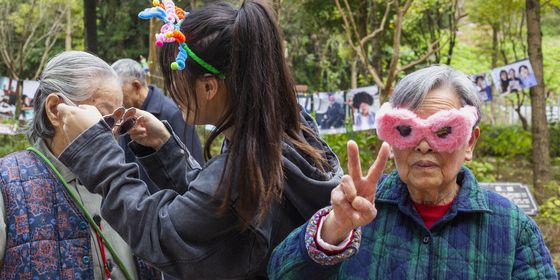Despite the efforts of volunteers, poor accessibility still hinders tourism for China’s visually impaired
Li Yong’s visual impairment hasn’t stopped him from traveling across China. Although Li can only perceive light or darkness, the 31-year-old has been organizing trips with his visually impaired friends for years.
In 2015, Li, along with two visually impaired friends, started a group in Hangzhou, Zhejiang province, dedicated to organizing tours for visually challenged individuals. In 2021, for example, he arranged a 4-day tour to Hengdian, Zhejiang, for a group of blind and low-vision individuals who navigated independently. “While it’s more convenient to travel with sighted guides, I feel somehow freer in a group of visually challenged peers,” Li tells TWOC. “I’m happy when we get together to talk and laugh, taste local delicacies, and relax.”
Over time, Li and his unofficial tour group helped dozens of people visit sites across the country. But despite a handful of organizations like Li’s, few of China’s more than 17 million visually impaired individuals manage to enjoy tourism unhindered.
Facilities for people with physical disabilities have slowly improved over recent years, but people with sensory impairments, including the visually impaired, have still been largely ignored, according to a study by scholars from Zhejiang Gongshang University in March this year. Accessible pedestrian crossings with audio aid are still uncommon, while many tourist attractions provide no special facilities for visually impaired visitors. Tour guides are still mostly reserved for sighted tourists. The cost of travel is also a significant obstacle for visually impaired individuals, with many of them employed in government-supported massage parlors.
A 5-day trip to Chengdu, Sichuan province, organized by Li a few years back, cost 2,300 yuan (without a guide dog which cost extra), excluding airfare which could cost thousands depending on where attendees flew from. With most visually impaired people in China earning around 3,500 yuan per month according to a 2016 survey by the China Information Accessibility Product Alliance, that amounts to a significant outlay.
Charities and volunteers have tried to solve the issue by providing travel services to visually impaired people for free. Hu Shancui, a 23-year-old IT worker in Hangzhou, used to organize trips regularly for visually impaired people via a volunteer association on campus when she was a student at Hangzhou Dianzi University from 2019 to the summer of 2023.
Hu wanted to help the visually impaired people, whom she often saw at massage parlors around the city, experience the sites of Hangzhou, one of the country’s most popular tourist destinations, and “put myself in the shoes” of visually impaired individuals, she tells TWOC. Every semester, she would lead groups of six to several dozen people plus guides on day trips to scenic sites in the city, such as West Lake and the Xixi Wetlands, free of charge.
After visiting several massage parlors to gauge interest in the travel initiative, she found that many were hesitant to join the trips due to concerns about vehicle traffic and generally inaccessible environments outside. As she continued to plan the trips, she began to understand why.
For just a day trip in Hangzhou, a city she is familiar with, itinerary planning had to begin two months in advance to ensure accessibility for every step of the planned route. Hu would contact the management of scenic sites or tourist attractions to make sure they offer ticket concessions for the visually impaired. While provincial regulations in Zhejiang make such concessions mandatory, there have been several reports in recent years of visually impaired tourists being denied lower prices or even forbidden from entering various tourist attractions.
Finding travel insurance for the tourists is another hurdle. According to a 2017 survey by the Accessibility Research Association, a Shenzhen-based NGO, 91.8 percent of 1,078 visually impaired participants had been declined by insurance companies at least once. When Hu organized a trip to the Xixi Wetlands in Hangzhou, she couldn’t find any insurance firm willing to insure the visually impaired tourists. “We constantly worry that someone would fall into the water. Without insurance, we opted to bring our own medicine for emergencies, but it’s not like we have any professional staff who can perform CPR,” she tells TWOC.
Hu also generally avoided trips to indoor venues like museums due to their poor accessibility for the visually impaired. While some museums have started opening accessible exhibits, like the Nanjing Museum with its specialized area offering audio narration, touchable exhibits, and indoor tactile pavements, “accessibility in China’s museums is usually only available in temporary exhibitions or special events. In most cases, permanent whole-area accessible facilities and narration are not provided” as reported by China Culture Daily, an official newspaper, in 2019.
Li also notes that, while there have been improvements to accessibility in Hangzhou spurred by the city hosting the 2022 Asian Games and Asian Para Games in September and October this year, it is still difficult for him to get around. “When designing the tactile pavements, no one thought about consulting blind people for our opinions or experience. I never figured out why they would make pavements with metallic materials; they may be more durable, but they get very slippery on rainy days,” he says.
Moreover, there are few Braille signs in scenic spots and when there are, they are usually dotted on low-contrast plates, making it difficult for low-vision people to find them in their surroundings. Hangzhou is in one of China’s most prosperous regions, where visually impaired massage workers may earn up to 10,000 yuan per month. Yet Hu found that even these relatively well-off individuals often don’t think traveling is a viable option. Most spend all their time in the massage parlors where they work and sleep, using their wages on food and drinks after their long shifts.
There are only around four or five other similar organizations dedicated to assisting visually impaired individuals in traveling across the country, according to Hu. The Ge You Foundation in Beijing organizes accessible cross-country events in the Gobi Desert, but the intensive routes they offer prohibit many casual travelers from joining. In Guangzhou, Guangdong province, The Robins, a travel agency, offered accessible group tours for individuals with various impairments, including those who are visually challenged. They mainly provide expensive trips abroad but ceased operating in 2020.
Many organizations struggle to find volunteers and funding support. Hu had just graduated from college this summer and already saw a decline in student interest at her alma mater, attributing it to the academic pressure to focus on studies. While Hu used to organize trips on weekdays, taking leave from her classes, most outings now occur on weekends when massage parlors are at their busiest. The club had 16 members when Hu was involved, but it now only has seven.
Li’s unofficial tour group is also winding down, though for more personal reasons. He ran six trips in 2021, but only one in 2022. “When we were young and carefree, we used to hang out a lot. But now that everyone’s got their jobs and families, we don’t organize tours as often,” Li says.
Li has a guide dog, a rarity in China, to help him get around the neighborhood. On social media, Li shares videos of his dog, Collier, guiding him around town, across roads, and onto public transport. But they never walk on the tactile pavements designed for visually impaired people. Sighted pedestrians walk on and stand on them, cars park across them, and construction pops up along them without warning. For the majority of China’s visually impaired population without a guide dog, just walking around the neighborhood can be a challenge, let alone traveling across the country.















